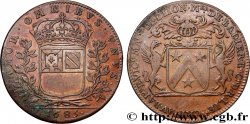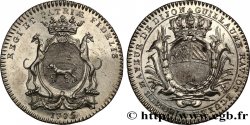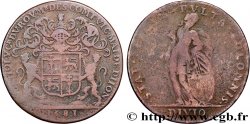E-auction 607-582541 - DIJON (MAYORS OF ... and miscellaneous) Jacques Laverne n.d.
You must signin and be an approved bidder to bid, LOGIN TO BID. Accounts are subject to approval and the approval process takes place within 48 hours. Do not wait until the day a sale closes to register. Clicking on « bid » constitutes acceptance of the terms of use of cgb.fr private e-auctions.
Bids must be placed in whole Euro amounts only. The sale will start closing at the time stated on the item description; any bids received at the site after the closing time will not be executed. Transmission times may vary and bids could be rejected if you wait until the last second. For further information ckeck the E-auctions F.A.Q.
NO BUYER'S FEE.
NO BUYER'S FEE.
Type : Jacques Laverne
Date: n.d.
Metal : copper
Diameter : 27,5 mm
Orientation dies : 6 h.
Weight : 5,46 g.
Edge : lisse
Rarity : R1
Catalogue references :
Obverse
Obverse legend : PROVIDENCIA. JUSTICIA. ET. PACE. VBERTAS.
Obverse description : La Providence, la Justice et la Paix debout ; à l’exergue les armes de Dijon.
Reverse
Reverse legend : * SVB. VMBRA. ALARVM. TVARVM. PROTEGE. ME. DOMINE.
Reverse description : Ses armes dans un écu orné.
Reverse translation : Protège-moi Maître sous l’ombre de tes ailes ouvertes.
Commentary
Jacques Laverne est avocat, seigneur d’Athée et avait été maire en 1566. Il fut réélu le 21 juin 1587 puis continué le 21 juin 1588. L’arbre figuré sur les armes est un verne ou aune, arbre de bois blanc qui croît dans les lieux humides.
Les maires de Dijon
Dès l’époque de la naissance de la féodalité, la ville de Dijon possédait un maire et en général vingt magistrats municipaux, ou échevins. Ces magistrats sont confirmés en 1187, lorsqu’une charte de commune est accordée par le duc Hugues III. En 1192, pour la première fois, le maire dijonnais est élu.
A la fin du XIIIe siècle, ce maire prend le titre de vicomte maïeur, confirmé en 1477-1479 par Louis XI, qu’il gardera jusqu’en 1789. Depuis la fin du XVe siècle (1491), la charge de vicomte maïeur est anoblissante ainsi que celle d’échevin à compter du XVIe siècle. Le vicomte maïeur avait le droit de haute, moyenne et basse justice, le droit de scel et de visite. Les clefs de la ville lui sont confiées et il dirige les archers ainsi que les compagnies des sept quartiers, cette fonction militaire étant importante jusqu’au XVIIe siècle.
Fonction élective, le vicomte maïeur est élu par les habitants, ni mendiants, ni étrangers, qui payent la taille, en général la veille de la Saint-Jean. Cette élection a lieu sur le parvis de l'église saint Philibert. A partir de 1669, il est permis au maire de porter "une robe longue de satin plein, de couleur violet, doublée de satin rouge cramoisi, comme le prévôt des marchands de Lyon, avec chaperon de même étoffe et couleur bordée d’hermine" afin de se distinguer des habitants.
En 1692, la fonction de vicomte maïeur est transformée en office héréditaire tandis que l’élection n’est plus alors qu’une confirmation du choix royal fait par le gouverneur au nom du roi.
Voir leur liste complète à http://fr.wikipedia.org/wiki/Liste_des_maires_de_Dijon.
Les maires de Dijon
Dès l’époque de la naissance de la féodalité, la ville de Dijon possédait un maire et en général vingt magistrats municipaux, ou échevins. Ces magistrats sont confirmés en 1187, lorsqu’une charte de commune est accordée par le duc Hugues III. En 1192, pour la première fois, le maire dijonnais est élu.
A la fin du XIIIe siècle, ce maire prend le titre de vicomte maïeur, confirmé en 1477-1479 par Louis XI, qu’il gardera jusqu’en 1789. Depuis la fin du XVe siècle (1491), la charge de vicomte maïeur est anoblissante ainsi que celle d’échevin à compter du XVIe siècle. Le vicomte maïeur avait le droit de haute, moyenne et basse justice, le droit de scel et de visite. Les clefs de la ville lui sont confiées et il dirige les archers ainsi que les compagnies des sept quartiers, cette fonction militaire étant importante jusqu’au XVIIe siècle.
Fonction élective, le vicomte maïeur est élu par les habitants, ni mendiants, ni étrangers, qui payent la taille, en général la veille de la Saint-Jean. Cette élection a lieu sur le parvis de l'église saint Philibert. A partir de 1669, il est permis au maire de porter "une robe longue de satin plein, de couleur violet, doublée de satin rouge cramoisi, comme le prévôt des marchands de Lyon, avec chaperon de même étoffe et couleur bordée d’hermine" afin de se distinguer des habitants.
En 1692, la fonction de vicomte maïeur est transformée en office héréditaire tandis que l’élection n’est plus alors qu’une confirmation du choix royal fait par le gouverneur au nom du roi.
Voir leur liste complète à http://fr.wikipedia.org/wiki/Liste_des_maires_de_Dijon.








 Report a mistake
Report a mistake Print the page
Print the page Share my selection
Share my selection Ask a question
Ask a question Consign / sell
Consign / sell
 Full data
Full data









